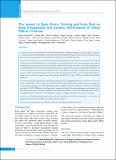Please use this identifier to cite or link to this item:
https://hdl.handle.net/20.500.14356/1221| Title: | The Impact of Basic Police Training and Scale Diet on Body Composition and Aerobic Performance of Nepal Police Officers Trainees |
| Authors: | Rajbhandari, Bibek Pant, Suman Adhikari, Bikram Gurung, Minani Poudel, Lisasha Shilpakar, Olita Karki, Sukadev Tamang, Motilal Yonzon Khadka, Purushottam Shrestha, Bikash Baniya, Bhupal Shrestha, Shrestha Thakuri, Bishal Jung Maharajan, Ashmita Singh, Ela Gajmer, Babita Singh, Sumi Regmi, Amuda Maskey, Prabina Tiwari, Bhuwaneshwor Mali, Anish |
| Citation: | RajbhandariB., PantS., AdhikariB., GurungM., PoudelL., ShilpakarO., KarkiS., Yonzon TamangM., KhadkaP., ShresthaB., BaniyaB., ShresthaB., ThakuriB. J., MaharajanA., SinghE., GajmerB., SinghS., RegmiA., MaskeyP., TiwariB., & MaliA. (2022). The Impact of Basic Police Training and Scale Diet on Body Composition and Aerobic Performance of Nepal Police Officers Trainees. Journal of Nepal Health Research Council, 19(04), 830-837. https://doi.org/10.33314/jnhrc.v19i04.3990 |
| Issue Date: | 2021 |
| Publisher: | Nepal Health Research Council |
| Article Type: | Original Article |
| Keywords: | Scale Diet Physical Training Body Fat Aerobic Performance VO2max Body Mass Index |
| Series/Report no.: | Oct-Dec, 2021;3990 |
| Abstract: | Abstract Introduction: Executing their daily duties, police officers are expected to perform complex, physically demanding activities, often at maximal levels of exertion. Given these criteria, training must be rigorous enough to ensure that when trainees graduate, they are competent in their response to crisis and flexible enough to sustain this for the span of their career. The present study aimed to determine the impact of scale diet and physical training (SDPT) on body composition and aerobic performance among Nepal police officer trainees. Method: We conducted a cross-sectional analytic study among 570 Nepal Police recruits from Nepal Police Academy of Butwal and Kathmandu. Null hypothesis was created followed by an alternative hypothesis. Alpha (1 - ?) for the above-mentioned study design were set. Parametric statistical analysis was done with criteria set for acceptance or rejection of the null hypothesis. We collected the data from the field as per Nepal police basic exercise and diet protocol to determine the effect of physical training and scale diet on body composition and aerobic performance. We enrolled all the recruits from March to May, 2019 who met the eligibility criteria in the study. We used Microsoft Excel 2013 for data entry and R program (version: 4.0.3) for statistical analysis. Results:There was a significant rise in aerobic performance (4.51 ± 3.39 ml/kg/min) and remarkable reduction in body fat (-4.49 ± 2.33 %) and Body Mass Index (-0.433 ± 1.00 kg/m2) after SDPT among participants with normal BMI at the time of recruitment. Body fat was significantly reduced (-4.36 ± 2.3%) and aerobic performance was significantly increased (6.93±4.70 ml/kg/min) among overweight participants at the time of recruitment. Conclusions: The methodology adopted in the physical training of Nepal Police was effective in reducing body mass index and fat, improving the physical capacity. . Key words: Scale Diet; Physical Training, Body Fat; Aerobic Performance; VO2max, Body Mass Index |
| Description: | Original Article |
| URI: | http://103.69.126.140:8080/handle/20.500.14356/1221 |
| ISSN: | Print ISSN: 1727-5482; Online ISSN: 1999-6217 |
| Appears in Collections: | Vol. 19 No. 04 (2021): Vol 19 No 4 Issue 53 Oct-Dec 2021 |
Files in This Item:
| File | Description | Size | Format | |
|---|---|---|---|---|
| 3990-Manuscript-26805-1-10-20220313.pdf | Fulltext Download | 957.89 kB | Adobe PDF |  View/Open |
Items in DSpace are protected by copyright, with all rights reserved, unless otherwise indicated.
